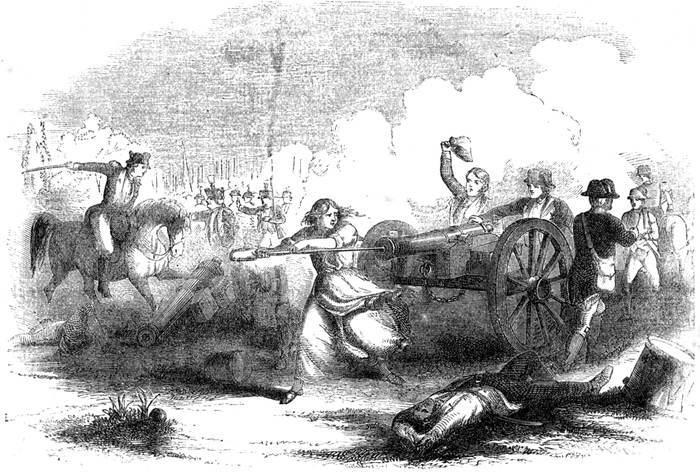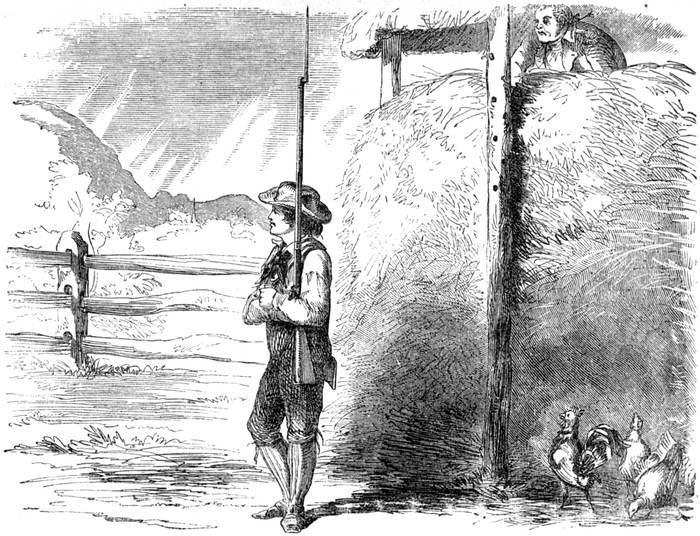Other documents randomly have different content
"Yell yer throat open, yer blasted red blood-hound!" thought the invincible Kentucky ranger.
Putting his soul into the effort, he bounded into the air with a power which astonished himself as much as his pursuers; trunk, limbs, brush, were cleared—he alighted in perfect safety on the other side. A loud yell of amazement burst from the band of savages who witnessed the feat, which not even the young chief, Messhawa, had the hardihood to repeat.
Kennan, however, had no leisure to enjoy his triumph. Dashing into the creek, where its high banks protected him from the fire of the Indians, he ran up the edge of the stream until he came to a convenient crossing-place, when he rejoined the encampment, where he threw himself on the ground, exhausted by his exertions. He had little time for rest. The Indians had begun a furious attack, which raged for three hours, and which resulted in a defeat of the whites still more disastrous than that of Harmar's.
In the retreat which followed, Kennan was attached to the battalion which had the dangerous service of protecting the rear. This corps quickly lost its commander, Major Clarke, and was completely demoralized. Kennan was among the hindmost when the retreat commenced; but the same powers which had saved him in the morning enabled him to gain the front, passing several horsemen in his flight. The retreat of the whole army was in the utmost disorder. The camp, artillery, baggage and wounded were left in the hands of the enemy. Most of the officers, who had fought bravely, were already fallen.
St. Clair himself, who had been confined to his tent with the gout, made his escape on a pack-horse, which he could neither mount nor dismount without assistance. The flying troops made their way back to Fort Jefferson. Under such circumstances, it may be imagined that the line of flight was a scene of fearful disorder. The Indians, making matters more appalling by their yells of triumph, pursued the routed
foe. Giving up all efforts to protect the rear, the battalion to which Kennan belonged fled as it could, every man for himself.
It was here, as he was making good his own retreat, that our hero came across a private in his own company, an intimate friend, lying upon the ground with his thigh broken, who, in tones of piercing distress, implored each horseman to take him up. When he beheld Kennan coming up on foot he stretched out his hands entreatingly. Notwithstanding the imminent peril, his friend could not withstand this passionate appeal; he lifted him upon his back, and ran in that manner several hundred yards.
The enemy gained upon them so fast that Kennan saw the death of both was certain unless he relinquished his burden. He told his friend that he had done all he could for him, but that it was in vain. He could not save him, and unless he wished both to perish, to let go his clasp about his neck. The unhappy man only clung the more tenaciously; Kennan staggered on under his burden, until the foremost of the enemy were within twenty yards of him—then, yielding to a cruel necessity, he drew his knife from its sheath and severed the fingers of the wounded man, who fell to the ground, and was tomahawked three minutes after.
But if unsuccessful in the attempt to save this fated fellow-soldier, he had the pleasure, before the race was over, of saving the life of one who afterward became his warm and helpful friend.
Darting forward with renewed swiftness, after cutting his burden from him, he was again out of immediate danger, when he came across a young man, sitting upon a log, calmly awaiting the approach of his enemies. He was deadly pale, but his refined and handsome face wore not the least expression of fear.
"Don't you know the red-skins are upon us?" called out the ranger.
"I know it; but I can not help it. I have never been strong, and now I am wounded. I could not take another step to save my life. Go on —don't stop to pity me."
Kennan was too brave himself not to admire the calm courage of this young man. He looked about. A short distance off he saw an exhausted horse, refreshing himself upon the luxuriant grass. Running after the animal, he caught him without difficulty, brought him up, assisted the wounded stranger to mount, and ran by his side until they were out of danger. Fortunately the pursuit ceased about that time, the spoils of the camp offering attractions to the savages more irresistible even than the blood of the remaining whites. The stranger thus saved by Kennan was Madison, afterward Governor of Kentucky, who continued through life the friendship formed that day.
Kennan never entirely recovered from the superhuman exertions he was compelled to make on that disastrous day.
Of this melancholy campaign of St. Clair's, Hall, in his sketches of the West, says: "The fault was not in the leader, but in the plan of the expedition, and the kind of troops employed. All that an old commander could effect with such a force, under the circumstances by which he was surrounded and overruled, was accomplished by General St. Clair. The brilliant talents of this brave soldier and veteran patriot were exerted in vain in the wilderness. The wariness and perseverance of Indian warfare created every day new obstacles and unforeseen dangers; the skill of the experienced leader was baffled, and undisciplined force prevailed over military science. The art of the tactician proved insufficient when opposed to a countless multitude of wily savages, protected by the labyrinths of the forest and aided by the terrors of the climate. At a moment of fancied security his troops were assailed upon all sides by a numerous and well-organized foe, who had long been hanging on his flanks, and had become acquainted with his strength, his order of encampment, and the distribution of his force—who knew when to attack and where to strike."
The loss on this occasion was mournfully great; thirty-eight officers and eight hundred men were slain.
Hall further says: "In reference to all these (Indian) wars, it has never been sufficiently urged, that they were but a continuation, and
a protracted sequel to the War of Independence. For years after the United States had been acknowledged as a nation, Great Britain continued to hold a number of military posts within her Northwestern limits, and to urge a destructive warfare through her savageallies. It was against Britainthat St. Clair, Harmar, Wayne and Harrison fought; and they, with others, who bled in those Western wilds, contributed as much to the purchase of our independence, as those who fought for our birthright at an earlier period."
Oh, mother-country; how very like the worst personification of a stepmother thou hast ever been, and still art, to this fairest of thy children.
The Indians are remarkable for fleetness of foot and endurance. Trained from childhood to the forest and chase, to run without tiring is one of their most esteemed virtues. They have been known frequently to run down the deer. We have seen them, on the western plains, exhaust the horse in the contest for strength of "wind." One savage of the Osages used to run from one village to another, a distance of fifteen miles, in one hundred minutes, for a swallow of "fire-water," and his squaw once performed the feat in the space of two hours, for the price of three yards of red ribbon. The stories now related of Ellerson and Kennan prove that, in speed and endurance, the white man sometimes excels even the savages. We shall, in the course of these pages, have occasion to mention other instances of running for life.
MOLLY PITCHER AT MONMOUTH.
The battle of Monmouth was one of the most severely contested engagements of the Revolution. From the rising to the setting sun, on that sultry Sabbath in June, two armies strove for the mastery of that ensanguined field, until heaps of dead and dying strewed the plain, marking the path of the serried ranks as the ebb and flow of battle changed their relative positions. Both armies fought with a desperate determination to conquer, and instances of personal bravery and daring were innumerable; yet, when night drew her sable mantle over the earth, shrouding from sight the soul-sickening scene, neither party could claim the meed of victory. Of the many thrilling incidents of that eventful day, that which brought into conspicuous notice the heroine of our story was not the least interesting.
Molly Pitcher, or, as she was afterward more familiarly known, Captain Molly, was a sturdy young Irish woman of some twenty-two or twenty-three years of age, short, thick-set, with red hair, a freckled face, and a keen, piercing eye, which gave token of a spirit of mischief ever ready for a frolic or a fight. She was the wife of a Sergeant in an artillery corps, which had seen service since the commencement of the war, and was attached to him with all the warmth of the Irish disposition. She had followed him through all his campaigns, and was with him at Fort Clinton, in the Hudson highlands, when that post was attacked and captured by Sir Henry Clinton. Here, too, she gave a specimen of that reckless courage which distinguished her at Monmouth some nine months after. Her husband, who was in the act of touching off his piece, seeing the British scaling the walls, and getting in his rear, dropped his match,
and calling to Molly to follow, fled as fast as his legs would carry him. She, determined not to waste powder and ball, and knowing that her "petticoats" would protect her retreat in a measure, picked up the linstock, fired the piece, and then scampered off. She escaped scot-free, and when the scattered fugitives from the forts were collected, and the artillery was attached to the main army, she accompanied her husband as a sutler, and was with him through that bitter winter at Valley Forge.
When Sir Henry Clinton evacuated Philadelphia, and took up his march across the Jerseys, Washington left his winter camp and prepared to follow, hoping to get an opportunity to strike a blow which should animate his own troops and effectually cripple, perhaps capture, the British army. On the plains of Monmouth the hostile armies met in battle array. Of the details of the action it is not our province to speak. It will suffice our purpose to say that Lee had been ordered to attack the British on their first movement, and engage them until the main army of the Americans could be brought into action by Washington in person. The first part of his orders he had obeyed; the latter, for reasons never fully explained, he did not conform to, but retreated unexpectedly toward the main body, which movement was timely checked by Washington, who ordered the whole army into action. It became necessary, however, for a portion to fall back a second time; and to check the pursuit, the artillery, to which Molly's husband was attached, was stationed on an eminence, in the rear of a hedge-row, for that purpose. Molly herself was engaged in bringing water from a spring to assuage the thirst of the men at the guns, when she saw her husband struck down by a cannon-shot from the enemy, which cut him nearly in two, killing him instantly; at the same time she heard the commandant order the piece withdrawn, as he had no one to fill the place now vacant. Molly heard the order, and maddened by her loss, rushed forward, exclaiming as she did so: "No! you shan't remove the gun, neither. Shure, can't I ram it as well as Tom, there? Ah! it's kilt entirely he is, bad luck to the bloody vagabond that p'inted the gun that shot him. Sorra a day was it when ye 'listed, darlint, to leave me a lone widdy
now, with nary a soul to care whether I live or die. But I'll pay the dirty vagabonds for this day's work, cuss 'em." And thus alternately apostrophizing her husband and anathematizing the British, she continued to ram the gun until it was withdrawn. The activity and courage which she exhibited attracted the attention of all who witnessed it, and on the morning after the battle the circumstance was reported to General Greene, who was so much pleased at her bravery and spirit that he sent for her and determined to present her to the Commander-in-Chief. This he did, covered with dirt and blood as she was, and Washington, after questioning her, conferred on her a warrant as Sergeant, and subsequently, by his influence, her name was placed on the list of half-pay officers for life. She went ever after by the name of "Captain Molly," and the French officers, particularly, took a great deal of notice of her, and made her many presents. She dressed in a mongrel suit, composed of a cocked hat, soldier's coat with an epaulette on one shoulder, and petticoats. In this rig she would pass along the French lines any day and get her hat filled with crowns.
Molly Pitcher's bravery was not, perhaps, of the highest order, being a part of the natural recklessness of her character; but there were women, plenty of them, in the time of our country's peril, and during the still more dreadful dangers of the new country, who proved their heroism to be of the noblest sort. Not only the heroism of endurance, in which women always excel—the endurance of fear, privation, loneliness and grief—but the heroism of action. Of such metal was the deed of prowess which has immortalized the name of Elizabeth Zane. In 1777, Fort Henry, in Ohio county, Virginia, was attacked by Indians. The defence was made with vigor, until the ammunition became exhausted, when surrender seemed the only alternative—a fearful alternative, in view of the treacherous character of their enemies. There was a keg of powder in a house about twelve rods distant, to obtain which would prolong the defense, and perhaps preserve the lives of the whole garrison. It was resolved that one person should venture out, and, if possible, secure and bear into the fort the valued prize. The Indians having
retired a little distance, a favorable opportunity was afforded; but it became difficult to decide who should undertake the service, as many soldiers were emulous for the honor of executing the perilous enterprise.
Their contention was cut short by Miss Zane, who claimed to be chosen for performing the duty, upon the ground that the life of a soldier was more valuable to be employed in defending the fort, and also that her sex might save her errand from suspicion and thus secure its success. It was the latter plea, which was somewhat plausible, united to her resolution, which overcame the scruples of the officer in command, far enough to permit her to make the attempt.
Her sex might protect her! Ah! no one better than the girl herself knew how very slender was that "might"—for an instant her heart stood still in her bosom, as the gate of the fort opened a little and closed behind her, shutting her out in the very shadow of the valley of death! For one instant her eyes grew dark and her ears rung, and in her bosom she felt, by apprehension, the piercing anguish of a dozen bullets; but, as quickly, she rallied, and with a light, fleet foot passed on to the house, not running, for fear of calling down the suspicions of the murderous eyes which watched her every movement. The Indians observed her leave the fort, but, as she had hoped, did not at first comprehend her actions, allowing her to pass on to the building, without molesting her, probably absorbed in a momentary wonder at her sex and her audacity.
She reached the house, seized the powder, and hastened to return. By this time the savages had recovered from the spell which the first sight of the young heroine had thrown upon them; they saw the keg of powder in her arms, and with yells of anger, fired a volley after her as she ran rapidly toward the fort. Fortunately, not a bullet touched her. As they rattled about her, singing past her ears, they only gave activity to her movements. In another moment she was safe within the gate, to the unbounded joy of the garrison. Animated
by so noble an example, the men fought with a vigor which the enemy could not overcome, who were compelled to raise the siege.
The following anecdote, which is too well authenticated to be disputed, furnishes one instance, among thousands, of that heroic spirit which animated the American women during the struggle for Independence.
In 1775, a good lady lived on the seaboard, about a day's march from Boston, where the British then were. By some unaccountable mistake, a rumor was spread, in town and country, in and about her residence, that the regulars were on a march for that place, where they would arrive in about three hours. This was after the battle of Lexington, and all, as might be supposed, was in sad confusion; some were boiling with rage and full of fight; some in fear and tribulation were hiding their treasures; others flying for life. In this wild moment, when most people, in one way or another, were frightened from propriety, our heroine, who had two sons, aged respectively nineteen and sixteen, was seen preparing them to discharge their duty in the emergency. The eldest she was enabled to equip in fine style; she took her husband's fowling-piece, "made for duck or plover," (the good man being absent on a coasting voyage to Virginia,) and with it, the powder-horn and shot-bag. But the lad, thinking the duck and geese-shot not quite the size to kill regulars, his mother, with the chisel, cut up her pewter spoons, hammered them into slugs, put them into his bag, and he set off in great earnest, calling a moment, on the way, to see the parson, who said:
"Well done, my brave boy. God preserve you!"
The youngest was importunate for his equipments, but his mother could find nothing to arm him with but an old rusty sword. The boy seemed unwilling to risk himself with this alone, lingering in the street until his mother thus upbraided him:
"You, John H——, what will your father say, if he hears that a child of his is afraid to meet the British? Go along; beg or borrow a gun,
or you'll find one, child; some coward, I dare say, will be running away; then take his gun and march forward! If you come back, and I hear you have not behaved like a man, I shall carry the blush of shame on my face to the grave."
She then shut the door, wiped the tear from her eye, and abided the issue.
There were not wanting American ladies whose wit and courage could bring the blush of shame or anger to the haughty faces of the British officers. There is scarcely a more stinging retort on record than that which was given to the insolent Tarleton by a lady at Washington, before whom he was boasting his feats of gallantry. Said he:
"I have a very earnest desire to see your far-famed hero, Colonel Washington."
"Your wish, Colonel, might have been fully gratified," she promptly replied, "had you ventured to look behind you at the battle of the Cowpens."
Molly Pitcher at Monmouth. Page44.
It was in that battle that Washington had wounded Tarleton, which gave rise to an equally pointed remark from Mrs. Wiley Jones, to whom Tarleton had observed:
"You appear to think very highly of Colonel Washington; yet I have been told that he is so ignorant a fellow that he can hardly write his own name."
"It may be the case," she readily replied, "but no one knows better than yourself that he knows how to make his mark."
We should think that he would have been ready to drop the subject in the presence of ladies so well able to defend their country's gallant officers.
Mrs. Thomas Heyward, in two instances, with the utmost firmness refused to illuminate for British victories. An officer forced his way
into her presence, sternly demanding:
"How dare you disobey the order which has been issued? Why, madam, is not your house illuminated?"
"Is it possible for me, sir," replied the lady, with perfect calmness, "to feel a spark of joy? Can I celebrate the victory of your army while my husband remains a prisoner at St. Augustine?"
"That is of little consequence," rejoined the officer; "the last hopes of the rebellion are crushed by the defeat of Greene at Guilford. You shall illuminate."
"Not a single light," replied the lady, "shall be placed on such an occasion, with my consent, in any window of my house."
"Then, madam, I will return with a party, and before midnight, level it with the ground."
"You have power to destroy, sir, and seem well disposed to use it; but over my opinions you possess no control. I disregard your menaces, and resolutely declare—I will not illuminate!"
Mrs. Rebecca Motte was another lady who proved, in a signal manner, that her patriotism was equal to the severest test. After the abandonment of Camden to the Americans, Lord Rawdon, anxious to maintain his posts, directed his first efforts to relieve Fort Mott, at the time invested by Marion and Lee. This fort, which commanded the river, was the principal depot of the convoys from Charleston to Camden, and the upper districts. It was occupied by a garrison, under the command of Captain McPherson, of one hundred and sixty-five men, having been increased by a small detachment of dragoons from Charleston, a few hours before the appearance of the Americans.
The large new mansion-house belonging to Mrs. Motte, which had been selected for the establishment of the post, was surrounded by a deep trench, along the interior margin of which was raised a strong and lofty parapet. Opposite, and northward, upon another hill, was an old farm-house to which Mrs. Motte had removed when
dismissed from her mansion. On this height Lieutenant-Colonel Lee took position with his force, while Marion occupied the eastern declivity of the ridge on which the fort stood, the valley running between the two hills permitting the Americans to approach within four hundred yards.
McPherson was unprovided with artillery, but hoped to be relieved by the arrival of Lord Rawdon to dislodge the assailants before they could push their preparations to maturity. He therefore replied to the summons to surrender which came on May twentieth, about a year after the victorious British had taken possession of Charleston—that he should hold out to the last moment in his power.
The besiegers had carried on their approaches rapidly, by relays of working-parties, and, aware of the advance of Rawdon with all his force, had every motive for perseverance. In the night a courier arrived from General Greene, to advise them of Rawdon's retreat from Camden, and to urge redoubled activity; and Marion persevered through the hours of darkness in pressing the completion of the works. The following night Lord Rawdon encamped on the highest ground in the country opposite Fort Motte, where the despairing garrison saw with joy the illumination of his fires, while the Americans were convinced that no time was to be lost.
The large house in the center of the encircling trench left but a few yards of ground within the British works uncovered; burning the mansion, therefore, must compel the surrender of the garrison. This expedient was reluctantly resolved upon by Marion and Lee, who, always unwilling to destroy private property, felt the duty to be unusually painful in the present case. It was the summer residence of the owner, whose deceased husband had been a firm friend to his country, and whose daughter (Mrs. Pinckney) was the wife of a gallant officer then a prisoner in the hands of the British. Lee had made Mrs. Motte's dwelling his quarters, at her pressing invitation, and with his officers had shared her liberal hospitality. Not satisfied with polite attentions to the officers while they were entertained at her luxurious table, she had attended, with active benevolence, to
the sick and wounded, soothed the infirm with kind sympathy, and animated the desponding to hope.
It was thus not without deep regret that the commanders determined upon the sacrifice, and the Lieutenant-Colonel found himself compelled to inform Mrs. Motte of the unavoidable necessity of destroying her property. The smile with which the communication was received gave instant relief to the embarrassed officer. Mrs. Motte not only assented, but declared that she was "gratified with the opportunity of contributing to the good of her country, and should view the approaching scene with delight." Shortly after, seeing by accident the bows and arrows which had been prepared for to carry combustible matter, she sent for Lee, and, presenting him with a bow and its apparatus, which had been imported from India, requested his substitution of them, as better adapted for the object than those provided.
An interesting incident, illustrative of female patriotism and activity, is given by Mr. Headley as occurring in the church at Litchfield, Connecticut. The pastor, Judah Champion, was an ardent patriot, and on a certain Sabbath was earnestly preaching and praying for the success of the American arms. During the service a messenger arrived, announcing that St. John's—which had been besieged six weeks, and was regarded as the key to Canada—was taken. "Thank God for the victory!" exclaimed the patriot preacher, and the chorister, clapping his hands vigorously, shouted: "Amen, and amen!"
The communication of the messenger announced that our army was in a suffering condition, destitute of clothing, without stockings or shoes. "Sorrows and pity took the place of exultation, and generous sympathetic eyes filled with tears on every side. There was scarcely a dry eye among the females of the congregation. As soon as the audience was dismissed, they were soon gathered together in excited groups, and it was evident that some scheme was on foot that would not admit of delay. The result was, that when the congregation assembled in the afternoon, not a woman was to be
seen. The men had come to church, but their earnest, noble wives and daughters had taken down their hand-cards, drawn forth their spinning wheels, set in motion their looms, while the knitting and sewing needles were plied as they never were before. It was a strange spectacle to see that Puritan Sabbath turned into a day of secular work. The pastor was at the meeting-house, performing those duties belonging to the house of God, and the voice of prayer and hymns of praise ascended as usual from devout and solemn hearts; but all through the usually quiet streets of Litchfield the humming of the spinning-wheel, the clash of the shuttle flying to and fro, were heard, making strange harmony with the worship of the sanctuary. But let it not be supposed that these noble women had gone to work without the knowledge of their pastor. They had consulted with him, and he had given them his sanction and blessing.
"Swimming eyes and heaving bosoms were over their work, and lips moved in prayer for the destitute and suffering soldier. The pastor's wife contributed eleven blankets from her own stores to the collection."
The women of the Revolution were active in their service of relief and comfort to the armies of the country. "The supply of domestic cloth designed for families was in a short time, by the labor of the females, converted into coats for the soldiers; sheets and blankets were fashioned into shirts; and even the flannels already made up were altered into men's habiliments. Such aid was rendered by many whose deeds of disinterested generosity were never known beyond their own immediate neighborhood."
Weights of clocks, pans, dishes, pewter services of plate, then common, were melted by the women and given to the army to be used in defense of freedom.
In 1776, Lafayette passed through Baltimore, and was honored with a public reception. In the gayeties of the scene he was seen to be sad. "Why so sad?" said a gay belle. "I can not enjoy these festivities," said Lafayette, "while so many of the poor soldiers are
without shirts and other necessaries." "They shall be supplied," responded the fair ladies; and the scenes of the festive hall were exchanged for the service of their needles. They immediately made up clothing for the suffering soldiers—one of the ladies cutting out five hundred pairs of pantaloons with her own hands, and superintending the making.
In 1780, a cold and dreary winter, when the soldiers greatly suffered, the ladies of Philadelphia formed an Industrial Association for the relief of the American army. They solicited money, sacrificed their jewelry, and labored with their own hands. Mrs. Bache, daughter of Dr. Franklin, was a leading spirit in these patriotic efforts. "She conducted us," said a French nobleman, in describing the scene, "into a room filled with work lately finished by the ladies of Philadelphia. It was shirts for the soldiers of Pennsylvania. The ladies bought the cloth from their own private purses, and took a pleasure in cutting them out and sewing them together. On each shirt was the name of the married or unmarried lady who made it; and they amounted to twenty-two hundred. During the cold winter that followed, thousands of poor soldiers in Washington's camp had occasion to bless the women of Philadelphia for these labors of love."
THE BARONESS DE REIDESEL.
One of the most interesting papers of personal reminiscences, which has come down to us from Revolutionary times, is the narrative by the Baroness de Reidesel, wife of the distinguished German, the Baron de Reidesel, a Major-General in Burgoyne's army of invasion. With all the truth of a high-minded lady, and the devotion of a true wife and mother, she accompanied her husband to America, and was present at the disastrous defeat of Burgoyne at Saratoga. Her story gives us an inside view of the British camp, and reveals the hardships to which she was exposed. After the battle of Saratoga she witnessed the British retreat, and never after could refer to it without weeping—the terrible scene so affected her. In his rather pretentious "memoirs," General Wilkinson has engrafted her entire narrative. We give our readers so much of the interesting document as our space permits. The "women of America" will peruse it with intense interest. After detailing her experiences up to the day of battle, (October 7th, 1779,) she proceeds:
"I was at breakfast with my husband and heard that something was intended. On the same day I expected Generals Burgoyne, Phillips and Frazer to dine with us. I saw a great movement among the troops; my husband told me it was merely a reconnoissance, which gave me no concern, as it often happened. I walked out of the house and met several Indians in their war-dresses, with guns in their hands. When I asked them where they were going, they cried out: 'War! war!' meaning that they were going to battle. This filled me with apprehension, and I had scarcely got home before I heard reports of cannon and musketry, which grew louder by degrees, till at last the noise became excessive.
"About four o'clock in the afternoon, instead of the guests whom I expected, General Frazer was brought on a litter, mortally wounded. The table, which was already set, was instantly removed, and a bed placed in its stead for the wounded General. I sat trembling in a corner; the noise grew louder, and the alarm increased; the thought that my husband might be brought in, wounded in the same manner, was terrible to me, and distressed me exceedingly. General Frazer said to the surgeon, 'Tell me if my wound is mortal; do not flatter me.' The ball had passed through, his body, and, unhappily for the General, he had eaten a very hearty breakfast, by which his stomach was distended, and the ball, as the surgeon said, had passed through it. I heard him often exclaim, with a sigh, 'Ohfatalambition! Poor GeneralBurgoyne!Oh!mypoor wife!' He was asked if he had any request to make, to which he replied, that, 'IfGeneralBurgoyne would permit it, he would like to be buried, at six o'clock in the evening, on the top of a mountain, in a redoubt which had been builtthere.'
"I did not know which way to turn; all the other rooms were full of sick. Toward evening I saw my husband coming; then I forgot all my sorrows, and thanked God that he was spared to me. He ate in great haste, with me and his aid-de-camp, behind the house. We had been told that we had the advantage over the enemy, but the sorrowful faces I beheld told a different tale; and before my husband went away he took me aside, and said every thing was going very badly, and that I must keep myself in readiness to leave the place, but not to mention it to any one. I made the pretense that I would move the next morning into my new house, and had every thing packed up ready.
"Lady Ackland had a tent not far from our house; in this she slept, and the rest of the day she was in the camp. All of a sudden a man came in to tell her that her husband was mortally wounded, and taken prisoner. On hearing this she became very miserable. We comforted her by telling her that the wound was very slight, and advised her to go over to her husband, to do which she would certainly obtain permission, and then she could attend him herself.
She was a charming woman, and very fond of him. I spent much of the night in comforting her, and then went again to my children, whom I had put to bed.
"I could not go to sleep, as I had General Frazer and all the other wounded gentlemen in my room, and I was sadly afraid my children would wake, and by their crying disturb the dying man in his last moments, who often addressed me and apologized 'for the trouble hegave me.' About three o'clock in the morning, I was told that he could not hold out much longer; I had desired to be informed of the near approach of this sad crisis, and I then wrapped up my children in their clothes, and went with them into the room below. About eight o'clock in the morning hedied.
"After he was laid out, and his corpse wrapped up in a sheet, we came again into the room, and had this sorrowful sight before us the whole day; and, to add to the melancholy scene, almost every moment some officer of my acquaintance was brought in wounded. The cannonade commenced again; a retreat was spoken of, but not the smallest motion was made toward it. About four o'clock in the afternoon, I saw the house, which had just been built for me, in flames, and the enemy was now not far off. We knew that General Burgoyne would not refuse the last request of General Frazer, though, by his acceding to it, an unnecessary delay was occasioned, by which the inconvenience of the army was much increased. At six o'clock the corpse was brought out, and we saw all the Generals attend it to the mountain. The Chaplain, Mr. Brudenell, performed the funeral service, rendered unusually solemn and awful from its being accompanied by constant peals of the enemy's artillery. Many cannon-balls flew close by me, but I had my eyes directed toward the mountain, where my husband was standing, amidst the fire of the enemy; and, of course, I could not think of my own danger.
"General Gates afterward said, that, if he had known it had been a funeral, he would not have permitted it to be fired on.
"As soon as the funeral service was finished, and the grave of General Frazer closed, an order was issued that the army should
retreat. My calash was prepared, but I would not consent to go before the troops. Major Harnage, though suffering from his wounds, crept from his bed, as he did not wish to remain in the hospital, which was left with a flag of truce. When General Reidesel saw me in the midst of danger, he ordered my women and children to be brought into the calash, and intimated to me to depart without delay. I still prayed to remain, but my husband, knowing my weak side, said, 'Well, then, your children must go, that at least they may be safe from danger.' I then agreed to enter the calash with them, and we set off at eight o'clock.
"The retreat was ordered to be conducted with the greatest silence, many fires were lighted, and several tents left standing; we traveled continually through the night. At six o'clock in the morning we halted, which excited the surprise of all; this delay seemed to displease everybody, for if we could only have made another good march we should have been in safety. My husband, quite exhausted with fatigue, came into my calash, and slept for three hours. During that time, Captain Willoe brought me a bag full of bank notes, and Captain Grismar his elegant gold watch, a ring, and a purse full of money, which they requested me to take care of, and which I promised to do, to the utmost of my power. We again marched, but had scarcely proceeded an hour, before we halted, as the enemy was in sight; it proved to be only a reconnoitering party of two hundred men, who might easily have been made prisoners, if General Burgoyne had given proper orders for the occasion.
"The Indians had now lost their courage, and were departing for their homes; these people appeared to droop much under adversity, and especially when they had no prospect of plunder. One of my waiting-women was in a state of despair, which approached to madness; she cursed and tore her hair, and when I attempted to reason with her, and to pacify her, she asked me if I was not grieved at our situation, and on my saying I was, she tore her hat off her head and let her hair fall over her face, saying to me, 'It is very easy for you to be composed and talk; you have your husband with you; I have none, and what remains to me but the prospect of perishing or
losing all I have?' I again bade her take comfort, and assured her I would make good whatever she might happen to lose; and I made the same promise to Ellen, my other waiting-woman, who, though filled with apprehension, made no complaints.
"About evening we arrived at Saratoga; my dress was wet through and through with rain, and in this state I had to remain the whole night, having no place to change it; I however got close to a large fire, and at last lay down on some straw. At this moment General Phillips came up to me, and I asked him why he had not continued our retreat, as my husband had promised to cover it, and bring the army through? 'Poor, dear woman,' said he, 'I wonder how, drenched as you are, you have the courage still to persevere, and venture further in this kind of weather; I wish,' continued he, 'you was our commanding General; General Burgoyne is tired, and means to halt here to-night and give us our supper.'
"On the morning of the 17th, at ten o'clock, General Burgoyne ordered the retreat to be continued, and caused the handsome houses and mills of General Schuyler to be burnt; we marched, however, but a short distance, and then halted. The greatest misery at this time prevailed in the army, and more than thirty officers came to me, for whom tea and coffee was prepared, and with whom I shared all my provisions, with which my calash was in general well supplied, for I had a cook who was an excellent caterer, and who often in the night crossed small rivers, and foraged on the inhabitants, bringing in with him sheep, small pigs, and poultry, for which he very often forgot to pay, though he received good pay from me so long as I had any, and was ultimately handsomely rewarded. Our provisions now failed us, for want of proper conduct in the commissary's department, and I began to despair.
"About two o'clock in the afternoon, we again heard a firing of cannon and small-arms; instantly all was alarm, and every thing in motion. My husband told me to go to a house not far off. I immediately seated myself in my calash, with my children, and drove off; but scarcely had we reached it before I discovered five or six
armed men on the other side of the Hudson. Instinctively I threw my children down in the calash, and then concealed myself with them. At this moment the fellows fired, and wounded an already wounded English soldier, who was behind me. Poor fellow! I pitied him exceedingly, but at this moment had no means or power to relieve him.
"A terrible cannonade was commenced by the enemy, against the house in which I sought to obtain shelter for myself and children, under the mistaken idea that all the Generals were in it. Alas! it contained none but wounded and women. We were at last obliged to resort to the cellar for refuge, and in one corner of this I remained the whole day, my children sleeping on the earth with their heads in my lap; and in the same situation I passed a sleepless night. Eleven cannon-balls passed through the house, and we could distinctly hear them roll away. One poor soldier who was lying on a table, for the purpose of having his leg amputated, was struck by a shot, which carried away his other; his comrades had left him, and when we went to his assistance, we found him in the corner of a room, into which he had crept, more dead than alive, scarcely breathing. My reflections on the danger to which my husband was exposed now agonized me exceedingly, and thoughts of my children, and the necessity of struggling for their preservation, alone sustained me.
"The ladies of the army who were with me, were Mrs. Harnage, a Mrs. Kennels, the widow of a Lieutenant who was killed, and the lady of the commissary. Major Harnage, his wife, and Mrs. Kennels, made a little room in a corner with curtains to it, and wished to do the same for me, but I preferred being near the door, in case of fire. Not far off my women slept, and opposite to us three English officers, who, though wounded, were determined not to be left behind; one of them was Captain Green, an aid-de-camp to MajorGeneral Phillips, a very valuable officer and most agreeable man. They each made me a most sacred promise not to leave me behind, and, in case of sudden retreat, that they would each of them take one of my children on his horse; and for myself, one of my husband's was in constant readiness.
"Our cook, whom I have before mentioned, procured us our meals, but we were in want of water, and I was often obliged to drink wine, and to give it to my children. It was the only thing my husband took, which made our faithful hunter, Rockel, express one day his apprehensions, that 'the General was weary of his life, or fearful of being taken, as he drank so much wine.' The constant danger which my husband was in, kept me in a state of wretchedness; and I asked myself if it was possible I should be the only happy one, and have my husband spared to me unhurt, exposed as he was to so many perils. He never entered his tent, but lay down whole nights by the watch-fires; this alone was enough to have killed him, the cold was so intense.
"The want of water distressed us much; at length we found a soldier's wife, who had courage enough to fetch us some from the river, an office nobody else would undertake, as the Americans shot at every person who approached it; but out of respect for her sex, they never molested her.
"I now occupied myself through the day in attending to the wounded; I made them tea and coffee, and often shared my dinner with them, for which they offered me a thousand expressions of gratitude. One day a Canadian officer came to our cellar, who had scarcely the power to hold himself upright, and we concluded he was dying for want of nourishment; I was happy in offering him my dinner, which strengthened him, and procured me his friendship. I now undertook the care of Major Bloomfield, another aid-de-camp of General Phillips; he had received a musket-ball through both cheeks, which in its course had knocked out several of his teeth, and cut his tongue; he could hold nothing in his mouth, the matter which ran from his wound almost choked him, and he was not able to take any nourishment except a little soup, and something liquid. We had some Rhenish wine, and in the hope that the acidity of it would cleanse his wound, I gave him a bottle of it. He took a little now and then, and with such effect that his cure soon followed: thus I added another to my stock of friends, and derived a satisfaction which, in the midst of suffering, served to tranquilize me.
"One day, General Phillips accompanied my husband, at the risk of their lives, on a visit to us. The General, after having witnessed our situation, said to him, 'I would not for ten thousand guineas come again to this place, my heart is almost broken.'
"In this horrid situation we remained six days; a cessation of hostilities was now spoken of, and eventually took place. A convention was afterward agreed on; but one day a message was sent to my husband who had visited me, and was reposing in my bed, to attend a council of war, where it was proposed to break the convention; but, to my great joy, the majority were for adhering to it. On the sixteenth, however, my husband had to repair to his post, and I to my cellar. This day fresh beef was served out to the officers, who till now had only had salt provisions, which was very bad for their wounds. The good woman who brought us water made us an excellent soup of the meat, but I had lost my appetite, and took nothing but crusts of bread dipped in wine. The wounded officers, my unfortunate companions, cut off the best bit, and presented it to me on a plate. I declined eating any thing, but they contended that it was necessary for me to take nourishment, and declared they would not touch a morsel till I afforded them the pleasure of seeing me partake. I could no longer withstand their pressing invitations, accompanied as they were by assurances of the happiness they had in offering me the first good thing they had in their power, and I partook of a repast rendered palatable by the kindness and good-will of my fellow-sufferers, forgetting for a moment the misery of our apartment, and the absence of almost every comfort.
"On the 17th of October, the convention was completed. General Burgoyne and the other Generals waited on the American General Gates; the troops laid down their arms, and gave themselves up prisoners of war! And now the good woman who had supplied us with water at the hazard of her life received the reward of her services; each of us threw a handful of money into her apron, and she got altogether about twenty guineas. At such a moment as this how susceptible is the heart of feelings of gratitude!
"My husband sent a message to me, to come over to him with my two children. I seated myself once more in my dear calash, and then rode through the American camp. As I passed on, I observed, and this was a great consolation to me, that no one eyed me with looks of resentment, but that they all greeted us, and even showed compassion in their countenances at the sight of a woman with small children. I was, I confess, afraid to go over to the enemy, as it was quite a new situation to me. When I drew near the tents, a handsome man approached and met me, tookmy children from the calash, andhugged and kissedthem, which almost affected me to tears. 'You tremble,' said he, addressing himself to me; 'be not afraid.' 'No,' I answered, 'you seem so kind and tender to my children, it inspires me with courage.' He now led me to the tent of General Gates, where I found Generals Burgoyne and Phillips, who were on a friendly footing with the former. Burgoyne said to me, 'Never mind; your sorrows have an end.' I answered him, 'that I should be reprehensible to have any cares, as he had none; and I was pleased to see him on such friendly footing with General Gates.' All the Generals remained to dine with General Gates.
"The same gentleman who received me so kindly, now came and said to me, 'You will be very much embarrassed to eat with all these gentlemen; comewithyourchildrentomytent,whereIwillprepare for you a frugaldinner , andgive it witha free will.' I said, 'You are certainly a husband and a father , you have showed me so much kindness.' I now found that he was GENERAL SCHUYLER. He treated me with excellent smoked tongue, beefsteak, potatoes, and good bread and butter! Never could I have wished to eat a better dinner; I was content; I saw all around me were so likewise; and what was better than all, my husband was out of danger.
"When we had dined, he told me his residence was at Albany, and that General Burgoyne intended to honor him as his guest, and invited myself and children to do so likewise. I asked my husband how I should act; he told me to accept the invitation. As it was two days' journey there, he advised me to go to a place which was about three hours' ride distant. General Schuyler had the politeness to
send with me a French officer, a very agreeable man, who commanded the reconnoitering party of which I have before spoken; and when he had escorted me to the house where I was to remain, he turned back again.
"Some days after this we arrived at Albany, where we so often wished ourselves; but we did not enter it as we expected we should —victors! We were received by the good General Schuyler, his wife and daughters, not as enemies, but as kind friends; and they treated us with the most marked attention and politeness, as they did General Burgoyne, who had caused General Schuyler's beautifully finished house to be burnt. In fact, they behaved like persons of exalted minds, who determined to bury all recollections of their own injuries in the contemplation of our misfortunes. General Burgoyne was struck with General Schuyler's generosity, and said to him, 'You show me great kindness, though I have done you much injury.' 'That was the fate of war,' replied the brave man, 'let us say no more about it.'"
This presents a picture of those trying times upon which it is both pleasurable and painful to dwell. It outlines General Schuyler as a noble nature, which is true to history. He was a brave among the brave—chivalrous as the Cid, gentle as a woman, wise as Solomon. Next to Greene, he is regarded by those most conversant with the men of the Revolution, as the column which most sustained Washington in his gigantic labors; while, as one of those who, after our independence was won, contributed most toward the reorganization of government and society. It is agreeable to contemplate such a character, for it heightens the worship which this generation feels for those who won the priceless boon of a nation's freedom!
The Little Sentinel.—Page7
TRADITIONS AND ROMANCE OF BORDER AND REVOLUTIONARY TIMES.
THE LITTLE SENTINEL. TECUMSEH AND THE PRISONERS. HORSEWHIPPING A TYRANT. THE MOTHER'S TRIAL.
NEW YORK: BEADLE AND COMPANY, PUBLISHERS, 118 WILLIAM STREET.
Entered according to Act of Congress, in the year 1863, by BEADLE AND COMPANY,
In the Clerk's Office of the District Court of the United States for the Southern District of New York.













